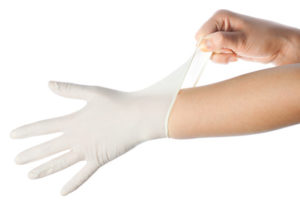Disposable gloves are often mandatory in the food industry, but their safety and hygiene efficiency are controversial. While they are essential in food processing companies, their benefits in the gastronomy are not always clear.
Personal hygiene in the food industry
Employees in food processing companies must comply with strict hygiene standards. These include
- Personal hygiene: Regular hand washing and disinfection.
- Work clothing: Suitable protective clothing is mandatory.
- Disposable gloves: Wearing disposable gloves is not a legal requirement, but can be useful in certain situations.
Benefits and risks of disposable gloves
There is no general answer to the question of whether disposable gloves are useful. They offer protection, especially for brief activities such as handling raw meat. However, you need to learn how to put them on and take them off correctly:
- Wash your hands before putting the gloves on: Wash and dry your hands thoroughly.
- Suitable glove size: To ensure optimum hygiene.
- Regular change: Especially when changing activities and products.
Risks due to improper use
Hands sweat under disposable gloves, which promotes the growth of bacteria. Gloves should therefore only be worn for short periods and changed regularly. Thorough hand hygiene between changes is crucial.
Skin protection
A skin protection plan is important to avoid skin problems. Regularly applying suitable skin protection creams to the hands after washing them protects the skin.
Studies and practical examples
Studies show that washed, clean hands are often just as effective as wearing disposable gloves. Gloves can provide a false sense of security, which can lead to unnoticed cross-contamination. A well-known example is the bakery assistant who uses the same gloves to handle bread and collect money.
Training and hygiene standards
Regular staff training in hand hygiene is the key to high food safety. Disposable gloves are useful for certain activities, while clean hands are preferable in other cases.
Basic rules of hand hygiene
- Short fingernails: No accumulation of dirt and bacteria.
- No jewelry: It can harbor dirt and bacteria.
- Wash your hands thoroughly: Regularly under warm running water with soap.
- Dry with disposable cloths: Dry well after washing.
- Change gloves: Wash your hands regularly and thoroughly in between.
Disposable gloves can improve hygiene in food processing if they are used correctly. However, training and consistent implementation of hand hygiene remain essential.






